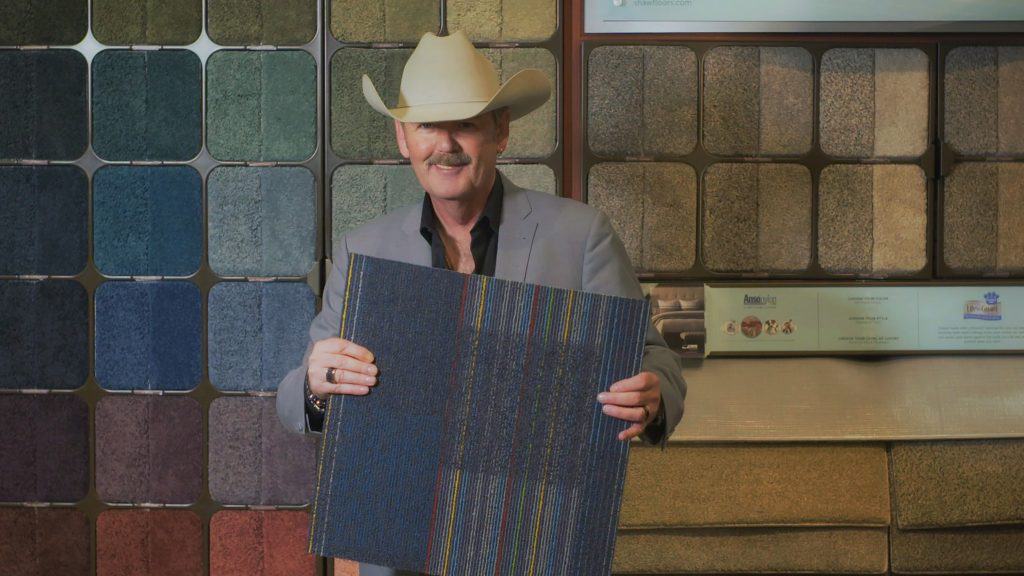Dalton, GA, and the surrounding area is the carpet capital of the world and the one-time home of the likes of Doug and Lloyd Caldwell, Roderick James, Lee Phillips, Lew Migliore, and Harry Ward. The area north of metro Atlanta is also home to a secret that many American industries already know: industrialization of the 20th century is efficiently being replaced by 21st-century technology and global competition. Directors Noah Collier and Emily Mackenzie use the documentary Carpet Cowboys to shed light on this transition, in hopes of saving future generations still mesmerized by the American Dream.
The documentary alternates between multiple men and their affiliation with the carpet industry. One wants to abandon America and move to Asia, another regrets the impact on the environment, while a third appreciates surviving this long and merely wants to hold on to their corner of the market. These participants are blended with a few others, as we oscillate between images of saving and moving on.

The father-and-son pair of Caldwell Carpet is one of the old-school relics that never sold out to larger companies. Regional buyouts led to a loss of community, yet the Caldwells remained local and small and survived the times. Though Doug, the senior Caldwell, passes away before filming concludes, their business still operates today. Unlike the Caldwells, Roderick James, the ‘star’ of the doc, made his career by providing originals to casinos and hotels through textile design but recently began shifting into other avenues to stay afloat. He’s still invested in carpet, but he’s also trying other business ventures such as country singing, designing clothes, and opening a bar. Though he won’t admit it, the carpet industry passed him by as business went high-tech and global, which brings us to our final side of the triangle, Harry Ward. Harry abandoned the carpet industry before it could abandon him, finding inspiration in stone and marble, preferring natural resources whenever possible.
Interspersed throughout the story, audiences also meet Lee Phillips, a carpet tester who uses feces, vomit, and urine samples to test carpets, along with walking durability tests, as well as Jon Black, a real country musician and cowboy that Roderick hopes to team up with. Lastly, there’s Lew Migliore, one of the few businessmen to remain in the industry, adapt, and find continued success. All of these personalities create the composite mentioned earlier, helping the audience to see how the carpet industry changed through globalization and technology, so anyone who did not adapt found themselves struggling upon realization.

Early in the film, Lew confidently reminds us, from behind a comfy office desk, that there were once “485 mills in a 25 square mile space”. Dalton had the most millionaires per capita at its peak and the 2nd highest divorce rate, right after Las Vegas, but all of this changed. His stats emphasize the unsaid: the industry shifted and businessmen needed to shift with it. Lew’s stats alternate with Harry Ward, the former carpet seller who condescendingly reminds us that carpet is actually dirty and many sellers don’t even use it in their homes. He reminds us that the trajectory of the industry was obvious. Harry is very much at peace with focusing on stone as his building material of choice, even finding pleasure in the pastime of collecting rocks with facial features in them. He’s much more connected to the Earth, even referencing being unsure of how much longer the world can maintain any form of industrialization at all. While searching for new face stones, he and his wife Missy agree people will all return to dirt eventually, also noting how a nearby creek used to run red, blue, and green because of the water released from nearby factories.

Roderick James never follows in the footsteps of the businessmen around him. He’s a Scottish transplant, twice divorced, with 2 daughters and 1 grandson, and in the early stages of a relationship with Rosario De La Rosa Boncodin, a Filipino businesswoman. She enjoys his cowboy persona but they both ignore the datedness of his mindset. As the film moves along, Roderick begins to fade, becoming more insincere and blind to his path, even though he constantly takes calls and pitches new ideas for carpet designs. To everyone’s surprise, he’s concurrently working on Tagalog so he can move to the Philippines, which for him is perfectly 2 hours from Shanghai, one of his other business outlets. In a reverse American Dream, he plans to leave for the East and build a 7 bedroom home there, but audiences can see the beginnings of regret in him, especially since he planned his successful rise alongside Jon. Design contracts fall through, everything feels forced and desperate, and Roderick cannot ignore his age. By the end of the film, he states “That dream is gone for me.” Though he’s the central story of the documentary, he can’t help but come across as a farce.

The documentary provides a few contrasts to the larger-than-life figure of Roderick, a figure audiences can’t quite prepare themselves for. Harry is the zen figure while Lew is the adaptive success. They clearly made different choices in their lives, but then there’s a young entrepreneur named Tripp Phillips who invented LeGlue, a semi-permanent glue for Legos. Though the connection feels random, Roderick is enlisted to write a jingle for LeGlue, a Shark Tank investment created by Tripp when he was a preteen. Roderick is focused on writing a song for LeGlue, but he should pay attention to Tripp and his father’s business acumen. Tripp was only 6 months shy of being the youngest patent owner. Instead of talking business, Roderick relies on Jon Black’s talent, and he is talented, to aid his own music career. Jon struggles to work with Roderick and audiences can tell they’re not on the same page in terms of creating music. Jon ends up doing all of the real work during their flat presentation. This becomes another missed opportunity and potentially Roderick’s last American business venture.
Few participants in the documentary want to state how the industry boom moved on. Americans now live in a world of homes purchased on Amazon and constructed in hours. For a more traditional route, our imitation wood floors interlock, snapping together in hours. The LeGlue founder sincerely is the turning point of the film, but no one realizes it. When the filming jumps ahead 2 years, Tripp is all grown up, driving a 2005 Lexus he bought cash and “focusing on just chilling.” He acknowledges that his business runs itself and he’s not even focused on entrepreneurship now. Nothing lasts forever, similar to the cowboy persona, a stolen caricature used to hold bravado and bluster together. When the film jumps to Roderick, now living in the Philippines permanently, the camera is close up on his vehicle as he prepares to take off through the streets. An offscreen engine turns over, revs, and takes off, only for Roderick, in a mid shot now, still stationary, on a bike that someone else is pedaling.

Our sympathetic character might be Jon Black, who put his livelihood and business on pause to help Roderick chase that dream. Before the time jump, Jon was slowly connecting the dots on the fickleness of Roderick but knew to neither tug nor pull at him. Roderick would likely fall apart. Jumping ahead again 2 years, Jon leaves us with a vague comment on how some people are John Wayne-style cowboys, just a hat and walk, while others are in the dirt with their modern look of Levis, boots, and a ball cap. Jon is forced to release Roderick, who literally hung up on him mid-call, so he can finish transplanting his American Dream.
Directors M. Emily Mackenzie and Noah Collier occasionally use silent footage of an unnamed man in a suit and matching cowboy hat, a material similar to 90s movie theater carpet. He slowly moves through hallways in B-roll footage, illustrating these men who made their fortunes in an industry, but were so focused on the money, they missed how the world advanced. They missed the writing on the wall and the floor. Even the carpet test specialist is using human labor, the majority of them women, to stress test carpets with 20,000 steps instead of using automation and AI. The film ends up being a cognitive exercise in regret, fate, and passing of the torch, never overflowing with somber acceptance or directly speaking to capitalism. The filmmakers don’t shun images of death though, both of the participants and their industry.
Carpet Cowboys is currently playing in select theaters courtesy of Memory and Brain Dead Studios.
[youtube https://www.youtube.com/watch?v=0YiQEHcmwrk]
The film ends up being a cognitive exercise in regret, fate, and passing of the torch, never overflowing with somber acceptance or directly speaking to capitalism. The filmmakers don’t shun images of death though, both of the participants and their industry.
-
8
-
User Ratings (0 Votes)
0

Jeffrey W. Peterson is a teacher, critic, and writer. He previously taught English Composition at Spelman College and the University of West Georgia, as well as Language Arts and percussion at metro-Atlanta high schools. He currently teaches at Fusion Academy in Alpharetta, GA, while pursuing a PhD in Moving Image Studies at Georgia State University. He has a BA in English, an MFA in Writing, and in addition to membership in Atlanta Film Critics Circle (AFCC), he’s also a member of the African-American Film Critics Association (AAFCA) and Black Film Critics Circle (BFCC), as well as a Tomatometer-approved critic. Previous work appears in Naija Nerds, The Streamr, Murphy’s Multiverse, and Indie Film Minute.






